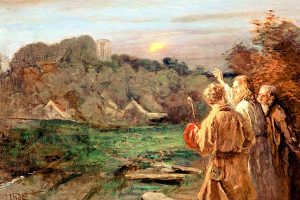Readings (Year C):
2 Maccabees 7:1 – 2, 9 – 14
Psalms 17:1, 5 – 6, 8, 15
2 Thessalonians 2:16 – 3:5
Luke 20:27 – 38
Reflection: I look forward to the Resurrection of the Dead.
Every Sunday, Catholics around the world recite these words as part of our creed. But often, saying these words, I ask myself: Do I really believe this? Thus far, no one has come back from the dead to tell us what an afterlife looks like. The naturalistic worldview that permeates our society suggests that there is nothing to look forward after death; when our brains shut down, so do we.
This view is not too different from that of the Sadducees in today’s gospel. At this moment in Luke’s narrative, Jesus has made a triumphant entry into Jerusalem, expelled the money changers from the temple, and begun teaching. As the chief priests and scribes question his authority, I have to wonder: does he know that in under a week he will be put to death?
Among his challengers, a group of Sadducees, who do not believe in the resurrection, pose what seems like a trick question. Imagine a woman who married seven brothers in succession. If all of them die, who will be her spouse after the resurrection?
When I hear this gospel, Jesus’ response startles me as much as it did those Sadducees. He essentially says, “none of them,” but also suggests “all of them.” He promises a reality where God’s love is so full, so absolute, that our normal, fragile human bonds not matter. In the words of spiritual writer Ronald Rolheiser, “all will be married to all”—a perfect fullness that is hard to imagine in our world of brokenness. The Sadducees are stunned into silence, and so am I.
It’s hard to imagine paradise. Dante Alighieri’s infamous Inferno, filled with elaborate tortures for a wide variety of sins, is much more tangible than his Paradiso, a lovely but abstract realm of perfect light. I catch the beatific vision in fleeting glimpses: watching the sun rise over yellow hills on a crisp autumn day, playing duck duck goose with a friend’s joyful four-year-old son, or singing happy birthday to my 81-year-old mother as she lay in a hospital bed last month.
While I often describe myself as what British writer Francis Spufford has called a “this-worldly Christian,” my mother’s recent health scare has compelled me to think hard about my parents’ mortality and my own. I’m a 39-year-old woman with no siblings, no spouse, no children. While I’m fortunate to have many strong friendships, it sometimes feels like my octogenarian parents are the only permanent fixture in my life, and every day I draw closer to losing them. What will I do when they are gone? And where will they go? The truth is, no matter what our creeds tell us, none of us knows for sure.
Rushed to the hospital following a previously undiagnosed heart condition, initially needing supplemental oxygen as the nurses strove to bring her heart rate down, my mother came very close to ending her life abruptly. Thankfully, she has been granted more time. After 9 days in the hospital and 11 in a rehab facility, she is recovering at home, accompanied by my father and a dear friend who is cooking nutritious food and organizing her pills. For me, this is where God’s goodness is found, in daily acts of kindness that Paul reminds us we show one another, in our imperfect, broken, human love that offers glimpses of the fullness we seek. In these moments I hear the truth of those words we say each Sunday: “I look forward to the resurrection of the dead, and the life of the world to come.”













Add comment